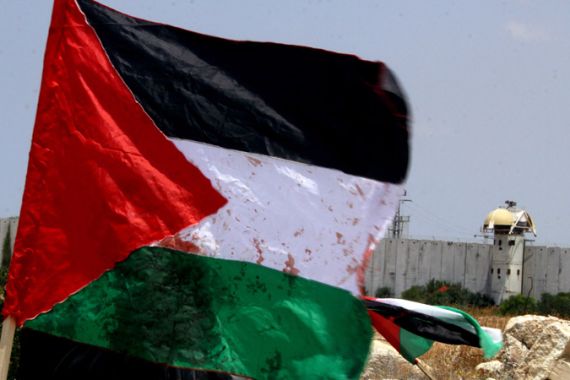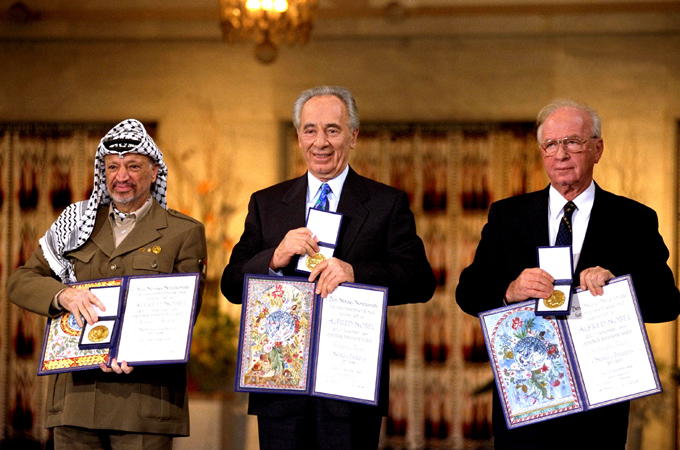The two state solution is dead
Voting on full membership for the PLO in the UN marks the end of the Oslo accords, says writer.

 |
| This month marks 18 years since the Oslo Accords and 20 years since the Madrid Conference [GALLO/GETTY] |
This week should be the end of the so-called peace process – and the ‘two state solution’. Whatever happens at the United Nations, the game is finished, and a transition to something else altogether is already underway.
This month marks 18 years since the signing of the Oslo Accords, and the declaration from the Palestinian side that they recognised Israel’s right to exist. In return, Israel recognised – the legitimacy of the PLO to represent the Palestinians. That was the exchange, and this asymmetry has shaped the ‘peace process’ ever since.
Another anniversary – this year is 20 years since the Madrid Conference that gave birth to Oslo. Two decades of negotiations and ‘temporary autonomy’; two decades of Israeli colonisation, Wall-building, and fact-making. But to best understand why this is, as Ali Abunimah put it, the funeral of the two state solution, recall a short phrase used by Israeli PM Netanyahu last week that echoed the words of former-PM Yitzhak Rabin.
Discussing the Palestinians’ UN initiative, Netanyahu said: “as long as it is less than a state, I’m ready to talk about it”. Here is Israel’s approach to decades of negotiations and ‘compromises’ in a nutshell.
Going back to 1995, and just a month before he was assassinated, the then-Israeli PM Rabin told the Knesset that “we would like this to be an entity which is less than a state”. Rabin, canonised by the high priests of ‘coexistence’, then went on to outline his understanding of a “permanent solution”: Jerusalem as Israel’s capital and the “establishment of blocs of settlements in Judea and Samaria”.
Then, like the surprise converts to the cause (Sharon, Olmert, etc.) that would come after him, Rabin’s talk of a Palestinian “state” was shaped by one, main motivation: the desire to preserve “a Jewish state” and avoid “a bi-national state”.
Thus while for many in the West it was assumed that the peace process was about geography, in fact for Israel it has always been about demography. Maximum land, minimum Arabs – and through their willing partners in the Palestinian Authority, “maximum power, minimum accountability”.
Recently, a discussion was held in London on Palestinian statehood featuring several prominent Israeli commentators and diplomats. The overwhelming consensus was that ‘demography’ made a two state solution imperative in order to save Israel as a Jewish state. As Fox News regular Alon Pinkas pithily put it: “Our homeland has a lot of Arabs, tough luck”.
David Landau, former-Ha’aretz journalist and now with The Economist, was the most angst-ridden of them all. We should be rejoicing, he said, that the Palestinians under Mahmoud Abbas still want a two state solution and are not asking for ‘one man, one vote’.
To a certain extent, he’s right; it is not the current Palestinian leadership that will reframe the struggle. But that time is coming. While Palestinians and their supporters increasingly and intelligently place ‘rights’ at the centre of their campaigning, soon the recognition that Jews and Palestinians must share one country as equals will mean that the only ones left talking about a Palestinian state will be those trying to preserve a regime of Jewish ethno-religious exclusivity.
Ben White is a freelance journalist and writer, specialising in Palestine and Israel. His first book, Israeli Apartheid: A Beginner’s Guide, was published by Pluto Press in 2009, receiving praise from the likes of Desmond Tutu, Nur Masalha and Ghada Karmi.
The views expressed in this article are the author’s own and do not necessarily reflect Al Jazeera’s editorial policy.
